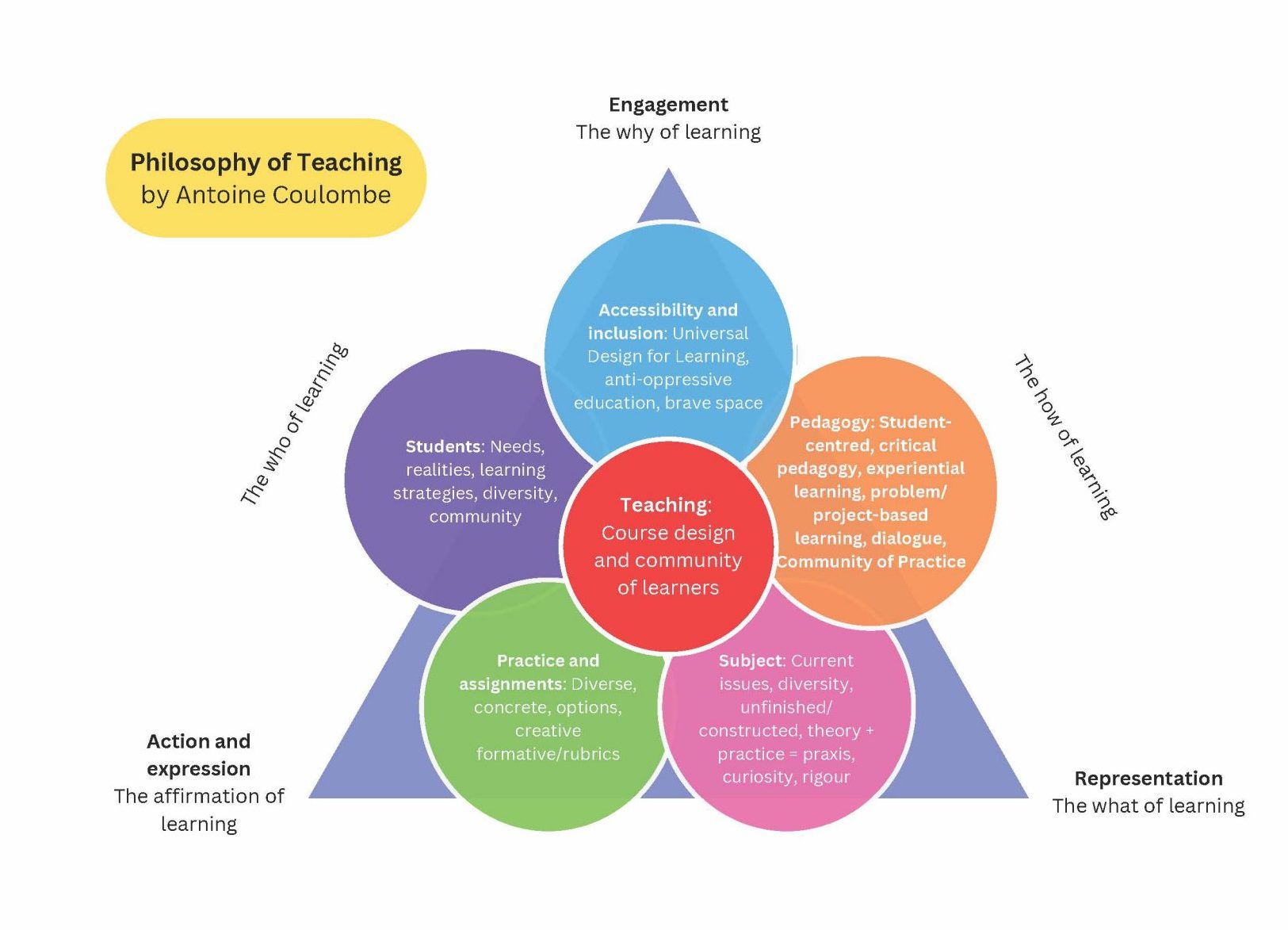Presented in my professional dossier, August 2024.
Professional Development prior to UBC—1999 to 2016
I began teaching SW in 2006 at a college (CEGEP) in Montreal. Over nine years, I taught eight courses, developed new curriculum materials, and learned from more experienced teaching colleagues. During this time, I also completed professional development courses, including:
- A year-long training program for new instructors
- Teaching and learning workshops
- Participation in a Community of Practice on applications of UDL
- Directed studies from a recognized university education program.
I also worked with education experts to collaboratively design cutting-edge pedagogy and tools such as new evaluation rubrics, collaborative classroom technologies and project-based teaching. One of the signature research projects I collaborated on was developing UDL as a teaching tool. My time teaching and learning at CEGEP helped me develop and strengthen my foundation as an educator.
Continuous Learning at UBC—2019 to Present
Since joining UBC, I have attended numerous workshops, conferences and programs to enhance my teaching and Scholarship of Teaching and Learning (SoTL). They include:
- Teaching and Learning Conference, Mount Royal University, 2021.
- International Association of Social Work with Groups Symposium, 2021.
- Centre for Teaching, Learning and Technology (CTLT) workshop, 2022: Classroom Evaluation and Research: Do I Need Ethics Approval.
- Canadian Association for Social Work Education (CASWE-ACFTS) conferences, 2019, 2021, 2022 and 2024.
- CTLT workshops, 2019: Course Design Intensive; Instructional Skills Workshop; Sharing Ideas, Tips and Strategies for Preparing EL CVs and Dossiers; Education for Connection and Purpose; Celebrate SoTL.
- Universal Design for Learning, Pan-Canadian Conference at Royal Roads University, 2019.
I also participate in several programs and groups for continuous professional development, including:
- UDL Fellow: In the summer of 2023, I joined a community of UDL fellows on campus and participated in a series of workshops, discussions and events on diversity and accessibility in teaching and learning. This provided me with an invaluable opportunity to deepen my understanding of these issues.
- ISoTL Scholar Member: In winter 2022, I joined the ISoTL as a Scholar member. According to the ISoTL UBC website, “The ISoTL Membership program was established in 2021 to create a formal group of experts to strengthen SoTL at UBC. Members will work together with the ISoTL leadership team to strengthen the UBC community of SoTL practitioners, engage in independent and collaborative SoTL within and beyond the classroom, and support each other in scholarly dissemination.”. Members discuss SoTL and participate in organizing events (e.g., Celebrate SoTL) on a monthly basis.
- UBC Educational Leadership Network Mentoring Program: In the summer of 2021, I joined the UBC EL mentorship program. This mentorship has given me essential guidance in understanding my work as an Assistant Professor of Teaching, the tenure process and navigating the different facets of academia.
- SoTL Seed Program: I have worked with the Institute of Scholarship of Teaching and Learning (ISoTL) Seed Program since 2020. I recently completed my second SoTL Seed Project, which provides a research expert, connection with specialists at the ISoTL UBC, and meetings to discuss completing a SoTL project with other faculty.
- Centre for Community Engaged Learning (CCEL): Since fall 2019, I have collaborated with advisors and faculty colleagues at the CCEL, UBC, to explore opportunities for community-engaged learning. In the spring of 2024, I was invited to join the Community Engaged Teaching Fellows, which offers a unique opportunity to participate in a cohort-based pathway focusing on community-engaged teaching and learning.
Engaging Students to Improve Course Design
Throughout my teaching career, both prior to and at UBC, students have been a key component of my foundation as an educator. I believe I have as much to learn from them as they do from me. In class, I take the time to learn who the students are and observe their interactions, which helps me to adapt my teaching strategies and styles to match their learning styles. I also seek feedback about the course and discuss the learning experience with them. Doing so creates stronger connections between students, the classroom experience and me. When students see how their voices can influence a course, it further motivates them to engage in the course and enhances their learning experience (Wickramasinghe and Timpson, 2006).
Here are some examples of my strategies for engaging with students:
- SOWK201: Students complete a survey (Qualtrics) before the first class to tell me about their experiences, motivations and learning strategies.
- SOWK440C/529A: At mid-term, I ask students to discuss the course, what is working and what is not working, and identify recommendations in my absence. Afterwards, I return to discuss their findings with them and adapt the course with the agreed-upon recommendations. This mid-term evaluation strategy is adapted from a practice employed at Université du Québec à Montréal.
- SOWK335: We conducted focus groups on the course’s primary pedagogy (Community of Practice (CoP) Pedagogy). This allowed students to share their experiences in depth and gave me valuable information on how to continue improving the pedagogy. We also conducted a student survey on the implementation of UDL in the course syllabus, assignment descriptions and CoP guiding documents.
- Student Experience of Instruction (SEI): I encourage students to participate in SEI surveys and share their experiences and ideas to improve the course. I read their evaluations and ideas, identify priorities to improve the course and integrate those improvements the following year. At the beginning of the semester, I present to students the main changes I made to the course inspired by ideas shared by previous students. By doing so, I demonstrate how engaging in SEI and sharing their ideas can contribute to meaningful change.

